BM001-3-M-RM Research Proposal: Tourism Impacts on Maafushi Islanders
VerifiedAdded on 2022/10/14
|29
|6684
|250
Project
AI Summary
This research proposal investigates the multifaceted impacts of tourism on the local community of Maafushi Island. The study aims to explore the economic, socio-cultural, and environmental consequences of tourism development, particularly concerning the increasing number of guest houses and hotels. The research delves into the perceptions of Maafushi Islanders regarding these changes, addressing the beneficial and adverse effects of tourism. The proposal outlines research objectives, questions, and hypotheses to guide the investigation. It also details the research methodology, including data collection methods, sampling strategies, and data analysis techniques. The study emphasizes the significance of community involvement in tourism planning and development, aiming to provide recommendations that maximize benefits and minimize negative impacts on the local population. The research is designed to contribute to a better understanding of the complex relationship between tourism and community well-being in Maafushi Island, and it identifies gaps in existing literature and seeks to fill them with empirical evidence.
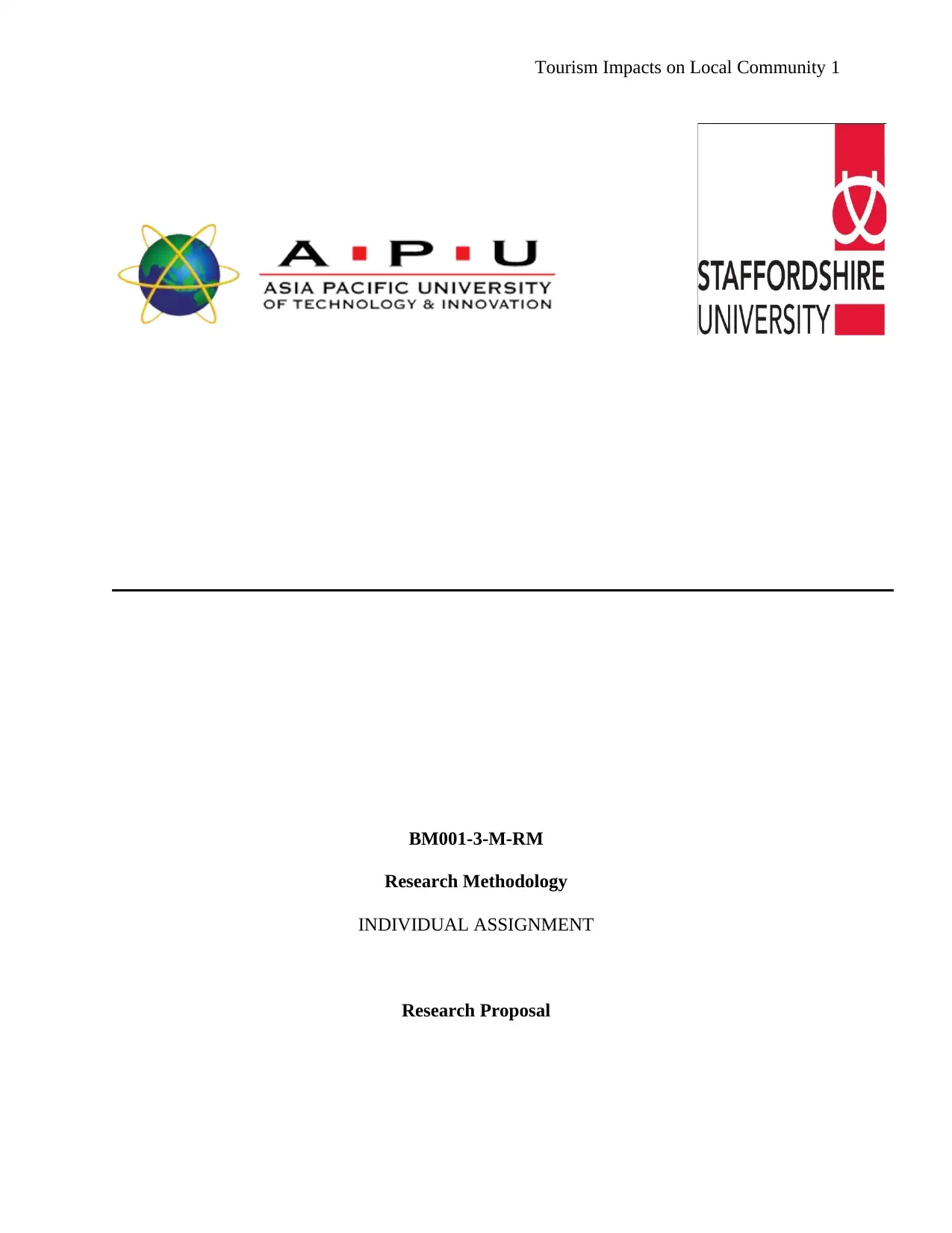
Tourism Impacts on Local Community 1
BM001-3-M-RM
Research Methodology
INDIVIDUAL ASSIGNMENT
Research Proposal
BM001-3-M-RM
Research Methodology
INDIVIDUAL ASSIGNMENT
Research Proposal
Paraphrase This Document
Need a fresh take? Get an instant paraphrase of this document with our AI Paraphraser
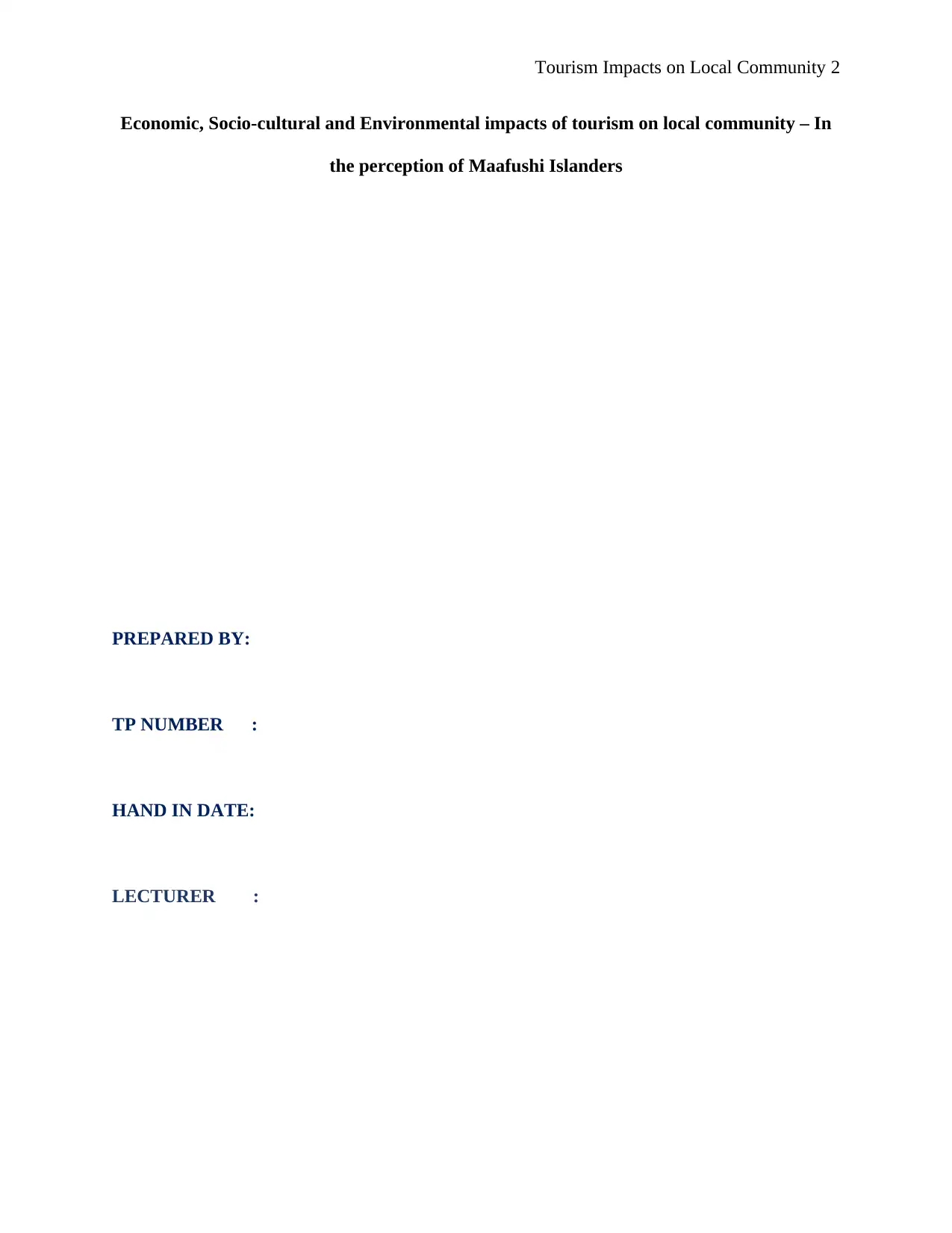
Tourism Impacts on Local Community 2
Economic, Socio-cultural and Environmental impacts of tourism on local community – In
the perception of Maafushi Islanders
PREPARED BY:
TP NUMBER :
HAND IN DATE:
LECTURER :
Economic, Socio-cultural and Environmental impacts of tourism on local community – In
the perception of Maafushi Islanders
PREPARED BY:
TP NUMBER :
HAND IN DATE:
LECTURER :
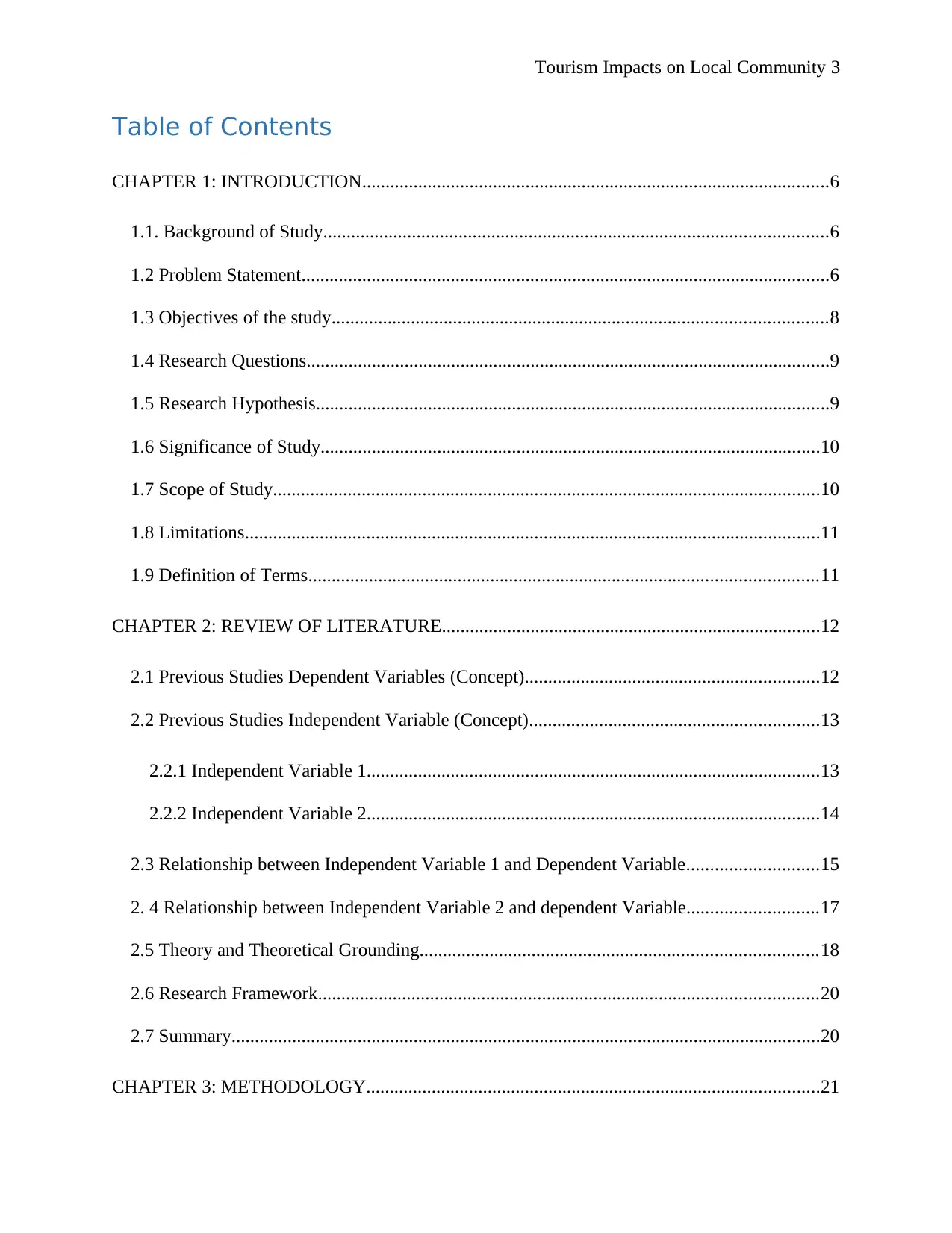
Tourism Impacts on Local Community 3
Table of Contents
CHAPTER 1: INTRODUCTION....................................................................................................6
1.1. Background of Study............................................................................................................6
1.2 Problem Statement.................................................................................................................6
1.3 Objectives of the study..........................................................................................................8
1.4 Research Questions................................................................................................................9
1.5 Research Hypothesis..............................................................................................................9
1.6 Significance of Study...........................................................................................................10
1.7 Scope of Study.....................................................................................................................10
1.8 Limitations...........................................................................................................................11
1.9 Definition of Terms.............................................................................................................11
CHAPTER 2: REVIEW OF LITERATURE.................................................................................12
2.1 Previous Studies Dependent Variables (Concept)...............................................................12
2.2 Previous Studies Independent Variable (Concept)..............................................................13
2.2.1 Independent Variable 1.................................................................................................13
2.2.2 Independent Variable 2.................................................................................................14
2.3 Relationship between Independent Variable 1 and Dependent Variable............................15
2. 4 Relationship between Independent Variable 2 and dependent Variable............................17
2.5 Theory and Theoretical Grounding.....................................................................................18
2.6 Research Framework...........................................................................................................20
2.7 Summary..............................................................................................................................20
CHAPTER 3: METHODOLOGY.................................................................................................21
Table of Contents
CHAPTER 1: INTRODUCTION....................................................................................................6
1.1. Background of Study............................................................................................................6
1.2 Problem Statement.................................................................................................................6
1.3 Objectives of the study..........................................................................................................8
1.4 Research Questions................................................................................................................9
1.5 Research Hypothesis..............................................................................................................9
1.6 Significance of Study...........................................................................................................10
1.7 Scope of Study.....................................................................................................................10
1.8 Limitations...........................................................................................................................11
1.9 Definition of Terms.............................................................................................................11
CHAPTER 2: REVIEW OF LITERATURE.................................................................................12
2.1 Previous Studies Dependent Variables (Concept)...............................................................12
2.2 Previous Studies Independent Variable (Concept)..............................................................13
2.2.1 Independent Variable 1.................................................................................................13
2.2.2 Independent Variable 2.................................................................................................14
2.3 Relationship between Independent Variable 1 and Dependent Variable............................15
2. 4 Relationship between Independent Variable 2 and dependent Variable............................17
2.5 Theory and Theoretical Grounding.....................................................................................18
2.6 Research Framework...........................................................................................................20
2.7 Summary..............................................................................................................................20
CHAPTER 3: METHODOLOGY.................................................................................................21
⊘ This is a preview!⊘
Do you want full access?
Subscribe today to unlock all pages.

Trusted by 1+ million students worldwide
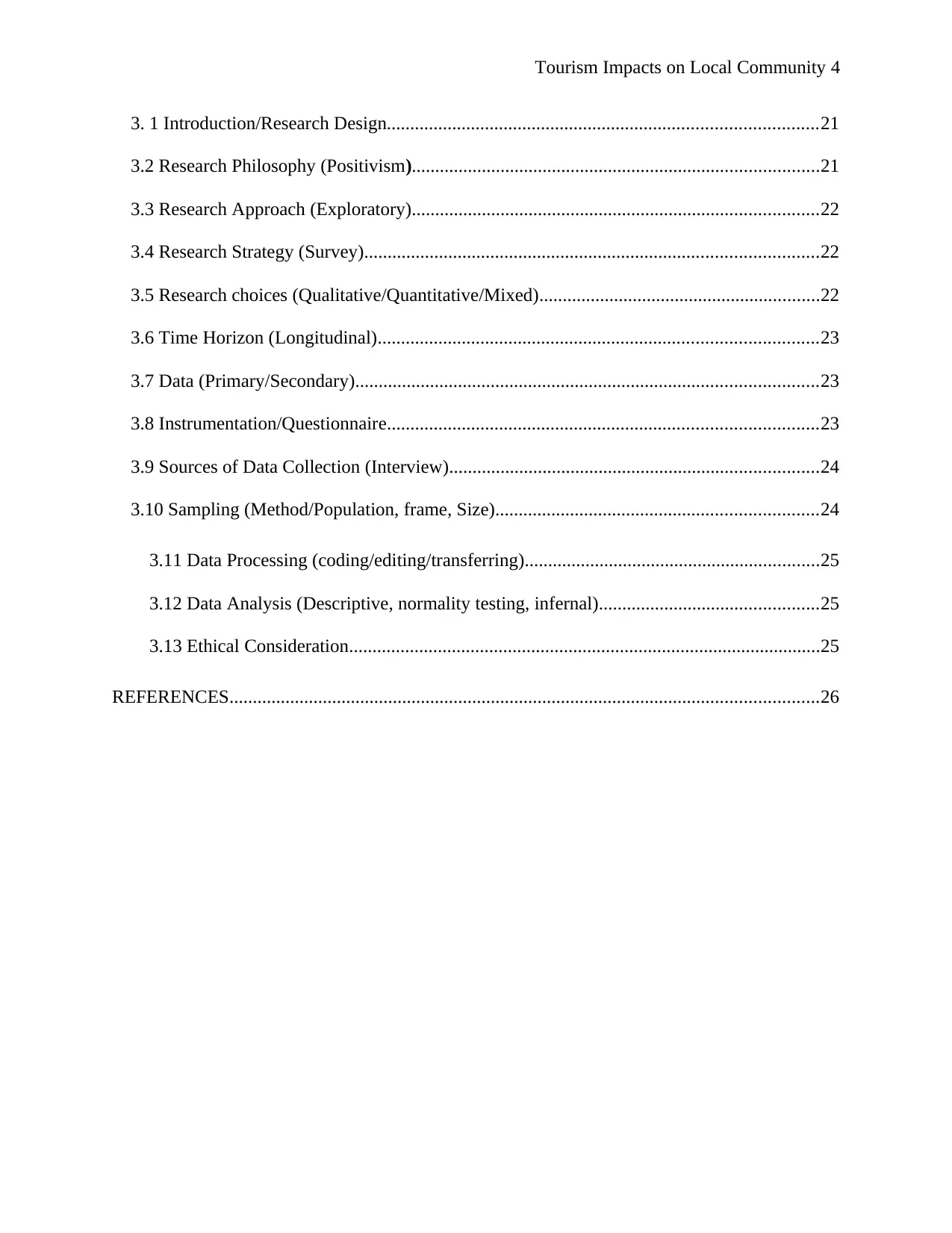
Tourism Impacts on Local Community 4
3. 1 Introduction/Research Design............................................................................................21
3.2 Research Philosophy (Positivism).......................................................................................21
3.3 Research Approach (Exploratory).......................................................................................22
3.4 Research Strategy (Survey).................................................................................................22
3.5 Research choices (Qualitative/Quantitative/Mixed)............................................................22
3.6 Time Horizon (Longitudinal)..............................................................................................23
3.7 Data (Primary/Secondary)...................................................................................................23
3.8 Instrumentation/Questionnaire............................................................................................23
3.9 Sources of Data Collection (Interview)...............................................................................24
3.10 Sampling (Method/Population, frame, Size).....................................................................24
3.11 Data Processing (coding/editing/transferring)...............................................................25
3.12 Data Analysis (Descriptive, normality testing, infernal)...............................................25
3.13 Ethical Consideration.....................................................................................................25
REFERENCES..............................................................................................................................26
3. 1 Introduction/Research Design............................................................................................21
3.2 Research Philosophy (Positivism).......................................................................................21
3.3 Research Approach (Exploratory).......................................................................................22
3.4 Research Strategy (Survey).................................................................................................22
3.5 Research choices (Qualitative/Quantitative/Mixed)............................................................22
3.6 Time Horizon (Longitudinal)..............................................................................................23
3.7 Data (Primary/Secondary)...................................................................................................23
3.8 Instrumentation/Questionnaire............................................................................................23
3.9 Sources of Data Collection (Interview)...............................................................................24
3.10 Sampling (Method/Population, frame, Size).....................................................................24
3.11 Data Processing (coding/editing/transferring)...............................................................25
3.12 Data Analysis (Descriptive, normality testing, infernal)...............................................25
3.13 Ethical Consideration.....................................................................................................25
REFERENCES..............................................................................................................................26
Paraphrase This Document
Need a fresh take? Get an instant paraphrase of this document with our AI Paraphraser

Tourism Impacts on Local Community 5
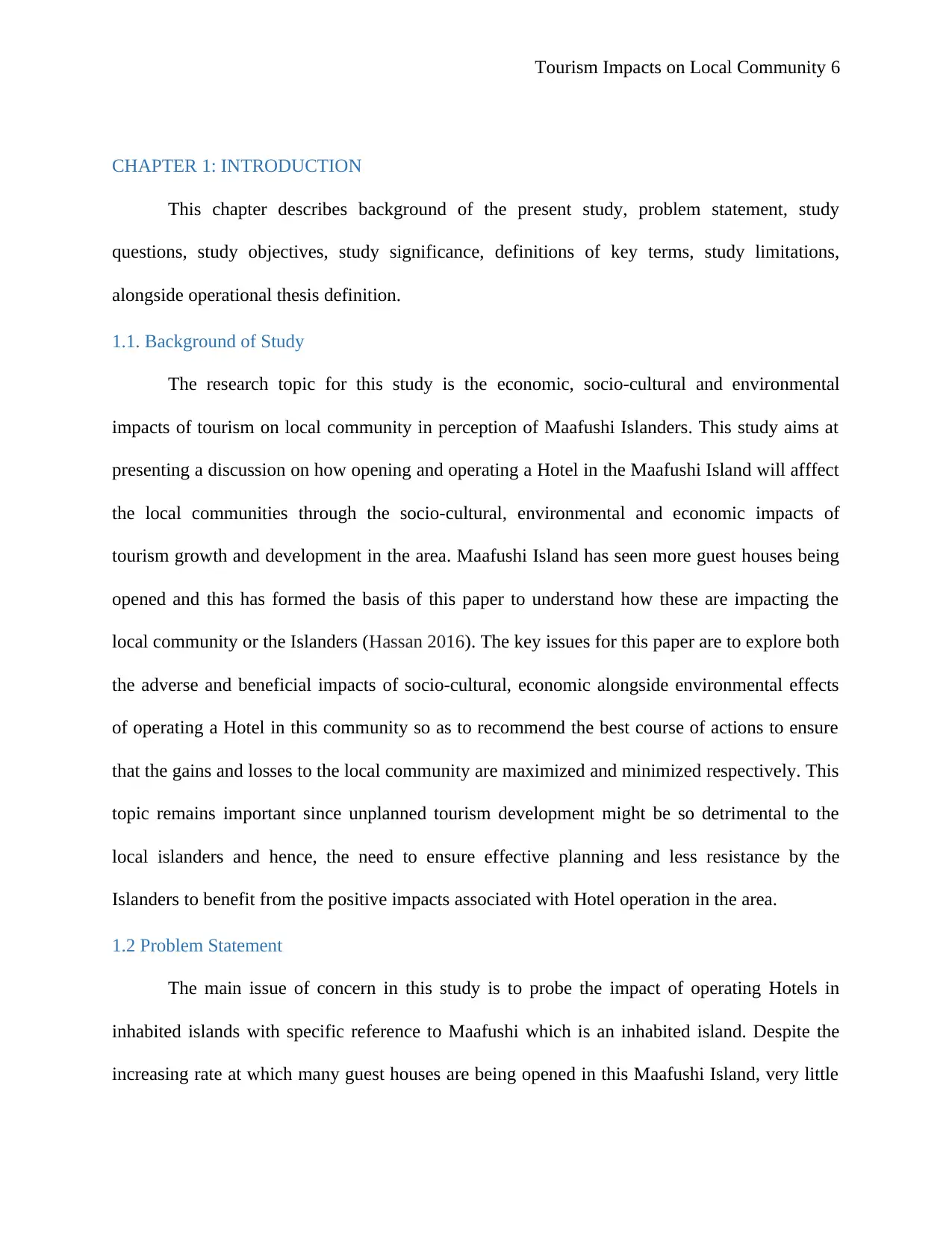
Tourism Impacts on Local Community 6
CHAPTER 1: INTRODUCTION
This chapter describes background of the present study, problem statement, study
questions, study objectives, study significance, definitions of key terms, study limitations,
alongside operational thesis definition.
1.1. Background of Study
The research topic for this study is the economic, socio-cultural and environmental
impacts of tourism on local community in perception of Maafushi Islanders. This study aims at
presenting a discussion on how opening and operating a Hotel in the Maafushi Island will afffect
the local communities through the socio-cultural, environmental and economic impacts of
tourism growth and development in the area. Maafushi Island has seen more guest houses being
opened and this has formed the basis of this paper to understand how these are impacting the
local community or the Islanders (Hassan 2016). The key issues for this paper are to explore both
the adverse and beneficial impacts of socio-cultural, economic alongside environmental effects
of operating a Hotel in this community so as to recommend the best course of actions to ensure
that the gains and losses to the local community are maximized and minimized respectively. This
topic remains important since unplanned tourism development might be so detrimental to the
local islanders and hence, the need to ensure effective planning and less resistance by the
Islanders to benefit from the positive impacts associated with Hotel operation in the area.
1.2 Problem Statement
The main issue of concern in this study is to probe the impact of operating Hotels in
inhabited islands with specific reference to Maafushi which is an inhabited island. Despite the
increasing rate at which many guest houses are being opened in this Maafushi Island, very little
CHAPTER 1: INTRODUCTION
This chapter describes background of the present study, problem statement, study
questions, study objectives, study significance, definitions of key terms, study limitations,
alongside operational thesis definition.
1.1. Background of Study
The research topic for this study is the economic, socio-cultural and environmental
impacts of tourism on local community in perception of Maafushi Islanders. This study aims at
presenting a discussion on how opening and operating a Hotel in the Maafushi Island will afffect
the local communities through the socio-cultural, environmental and economic impacts of
tourism growth and development in the area. Maafushi Island has seen more guest houses being
opened and this has formed the basis of this paper to understand how these are impacting the
local community or the Islanders (Hassan 2016). The key issues for this paper are to explore both
the adverse and beneficial impacts of socio-cultural, economic alongside environmental effects
of operating a Hotel in this community so as to recommend the best course of actions to ensure
that the gains and losses to the local community are maximized and minimized respectively. This
topic remains important since unplanned tourism development might be so detrimental to the
local islanders and hence, the need to ensure effective planning and less resistance by the
Islanders to benefit from the positive impacts associated with Hotel operation in the area.
1.2 Problem Statement
The main issue of concern in this study is to probe the impact of operating Hotels in
inhabited islands with specific reference to Maafushi which is an inhabited island. Despite the
increasing rate at which many guest houses are being opened in this Maafushi Island, very little
⊘ This is a preview!⊘
Do you want full access?
Subscribe today to unlock all pages.

Trusted by 1+ million students worldwide
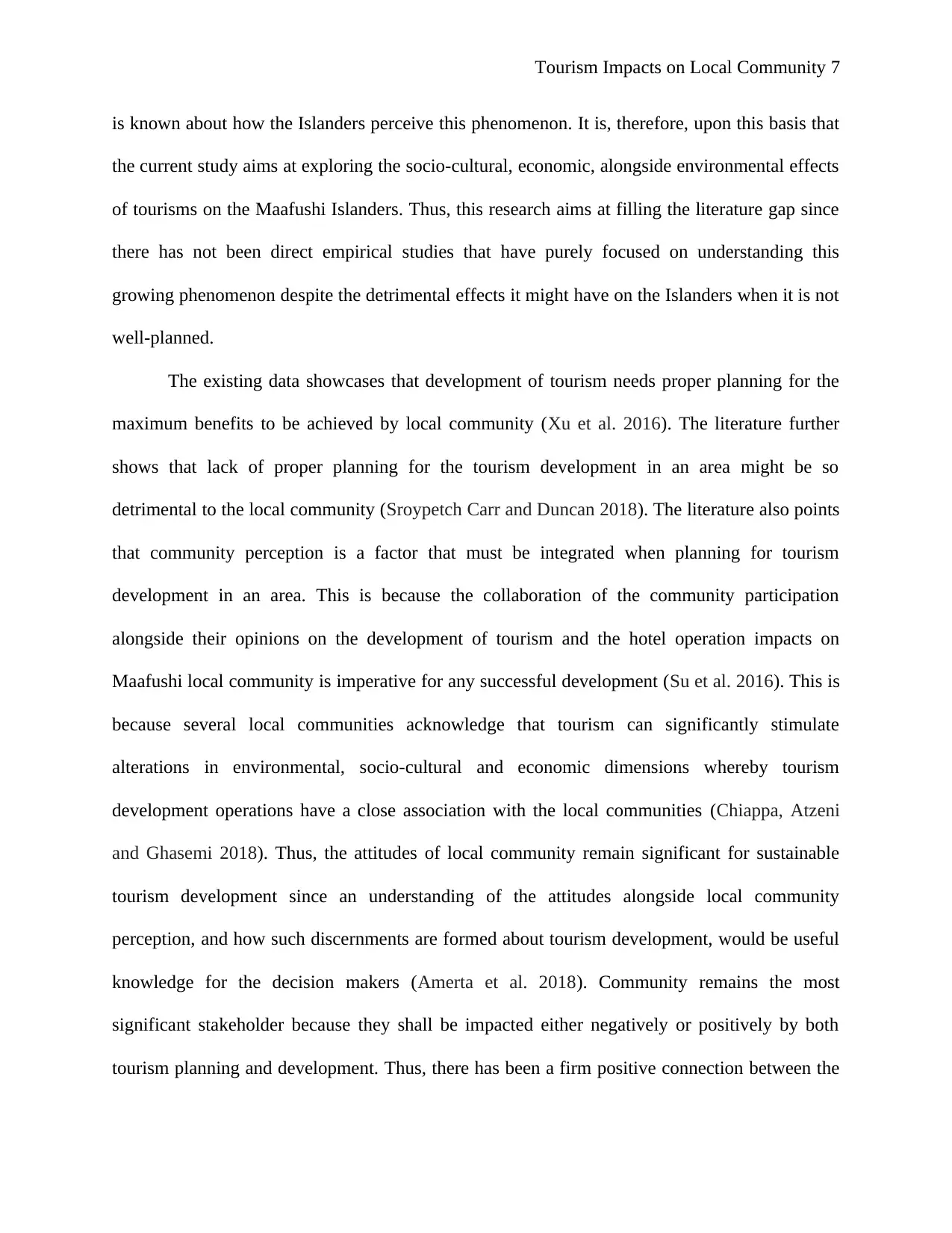
Tourism Impacts on Local Community 7
is known about how the Islanders perceive this phenomenon. It is, therefore, upon this basis that
the current study aims at exploring the socio-cultural, economic, alongside environmental effects
of tourisms on the Maafushi Islanders. Thus, this research aims at filling the literature gap since
there has not been direct empirical studies that have purely focused on understanding this
growing phenomenon despite the detrimental effects it might have on the Islanders when it is not
well-planned.
The existing data showcases that development of tourism needs proper planning for the
maximum benefits to be achieved by local community (Xu et al. 2016). The literature further
shows that lack of proper planning for the tourism development in an area might be so
detrimental to the local community (Sroypetch Carr and Duncan 2018). The literature also points
that community perception is a factor that must be integrated when planning for tourism
development in an area. This is because the collaboration of the community participation
alongside their opinions on the development of tourism and the hotel operation impacts on
Maafushi local community is imperative for any successful development (Su et al. 2016). This is
because several local communities acknowledge that tourism can significantly stimulate
alterations in environmental, socio-cultural and economic dimensions whereby tourism
development operations have a close association with the local communities (Chiappa, Atzeni
and Ghasemi 2018). Thus, the attitudes of local community remain significant for sustainable
tourism development since an understanding of the attitudes alongside local community
perception, and how such discernments are formed about tourism development, would be useful
knowledge for the decision makers (Amerta et al. 2018). Community remains the most
significant stakeholder because they shall be impacted either negatively or positively by both
tourism planning and development. Thus, there has been a firm positive connection between the
is known about how the Islanders perceive this phenomenon. It is, therefore, upon this basis that
the current study aims at exploring the socio-cultural, economic, alongside environmental effects
of tourisms on the Maafushi Islanders. Thus, this research aims at filling the literature gap since
there has not been direct empirical studies that have purely focused on understanding this
growing phenomenon despite the detrimental effects it might have on the Islanders when it is not
well-planned.
The existing data showcases that development of tourism needs proper planning for the
maximum benefits to be achieved by local community (Xu et al. 2016). The literature further
shows that lack of proper planning for the tourism development in an area might be so
detrimental to the local community (Sroypetch Carr and Duncan 2018). The literature also points
that community perception is a factor that must be integrated when planning for tourism
development in an area. This is because the collaboration of the community participation
alongside their opinions on the development of tourism and the hotel operation impacts on
Maafushi local community is imperative for any successful development (Su et al. 2016). This is
because several local communities acknowledge that tourism can significantly stimulate
alterations in environmental, socio-cultural and economic dimensions whereby tourism
development operations have a close association with the local communities (Chiappa, Atzeni
and Ghasemi 2018). Thus, the attitudes of local community remain significant for sustainable
tourism development since an understanding of the attitudes alongside local community
perception, and how such discernments are formed about tourism development, would be useful
knowledge for the decision makers (Amerta et al. 2018). Community remains the most
significant stakeholder because they shall be impacted either negatively or positively by both
tourism planning and development. Thus, there has been a firm positive connection between the
Paraphrase This Document
Need a fresh take? Get an instant paraphrase of this document with our AI Paraphraser
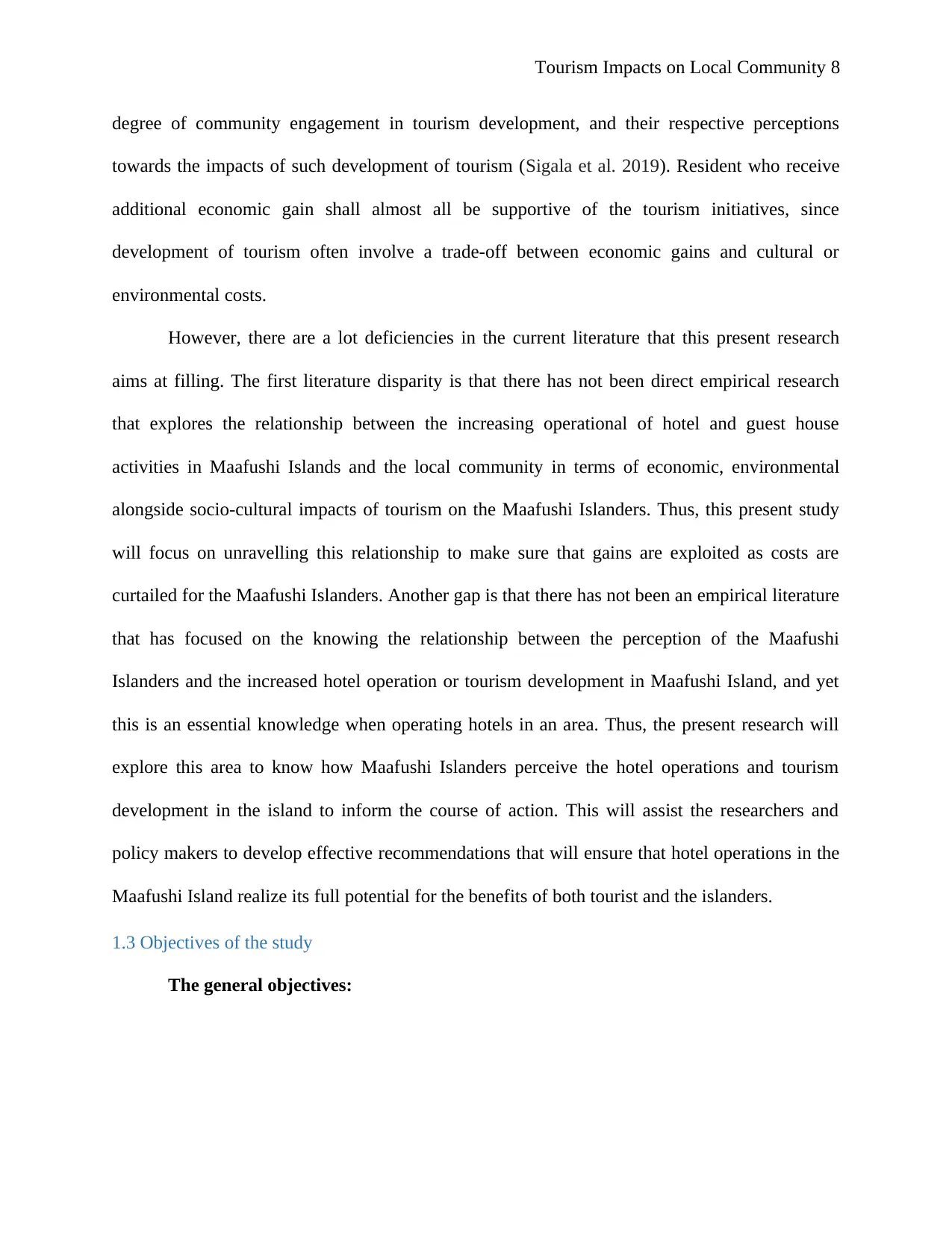
Tourism Impacts on Local Community 8
degree of community engagement in tourism development, and their respective perceptions
towards the impacts of such development of tourism (Sigala et al. 2019). Resident who receive
additional economic gain shall almost all be supportive of the tourism initiatives, since
development of tourism often involve a trade-off between economic gains and cultural or
environmental costs.
However, there are a lot deficiencies in the current literature that this present research
aims at filling. The first literature disparity is that there has not been direct empirical research
that explores the relationship between the increasing operational of hotel and guest house
activities in Maafushi Islands and the local community in terms of economic, environmental
alongside socio-cultural impacts of tourism on the Maafushi Islanders. Thus, this present study
will focus on unravelling this relationship to make sure that gains are exploited as costs are
curtailed for the Maafushi Islanders. Another gap is that there has not been an empirical literature
that has focused on the knowing the relationship between the perception of the Maafushi
Islanders and the increased hotel operation or tourism development in Maafushi Island, and yet
this is an essential knowledge when operating hotels in an area. Thus, the present research will
explore this area to know how Maafushi Islanders perceive the hotel operations and tourism
development in the island to inform the course of action. This will assist the researchers and
policy makers to develop effective recommendations that will ensure that hotel operations in the
Maafushi Island realize its full potential for the benefits of both tourist and the islanders.
1.3 Objectives of the study
The general objectives:
degree of community engagement in tourism development, and their respective perceptions
towards the impacts of such development of tourism (Sigala et al. 2019). Resident who receive
additional economic gain shall almost all be supportive of the tourism initiatives, since
development of tourism often involve a trade-off between economic gains and cultural or
environmental costs.
However, there are a lot deficiencies in the current literature that this present research
aims at filling. The first literature disparity is that there has not been direct empirical research
that explores the relationship between the increasing operational of hotel and guest house
activities in Maafushi Islands and the local community in terms of economic, environmental
alongside socio-cultural impacts of tourism on the Maafushi Islanders. Thus, this present study
will focus on unravelling this relationship to make sure that gains are exploited as costs are
curtailed for the Maafushi Islanders. Another gap is that there has not been an empirical literature
that has focused on the knowing the relationship between the perception of the Maafushi
Islanders and the increased hotel operation or tourism development in Maafushi Island, and yet
this is an essential knowledge when operating hotels in an area. Thus, the present research will
explore this area to know how Maafushi Islanders perceive the hotel operations and tourism
development in the island to inform the course of action. This will assist the researchers and
policy makers to develop effective recommendations that will ensure that hotel operations in the
Maafushi Island realize its full potential for the benefits of both tourist and the islanders.
1.3 Objectives of the study
The general objectives:
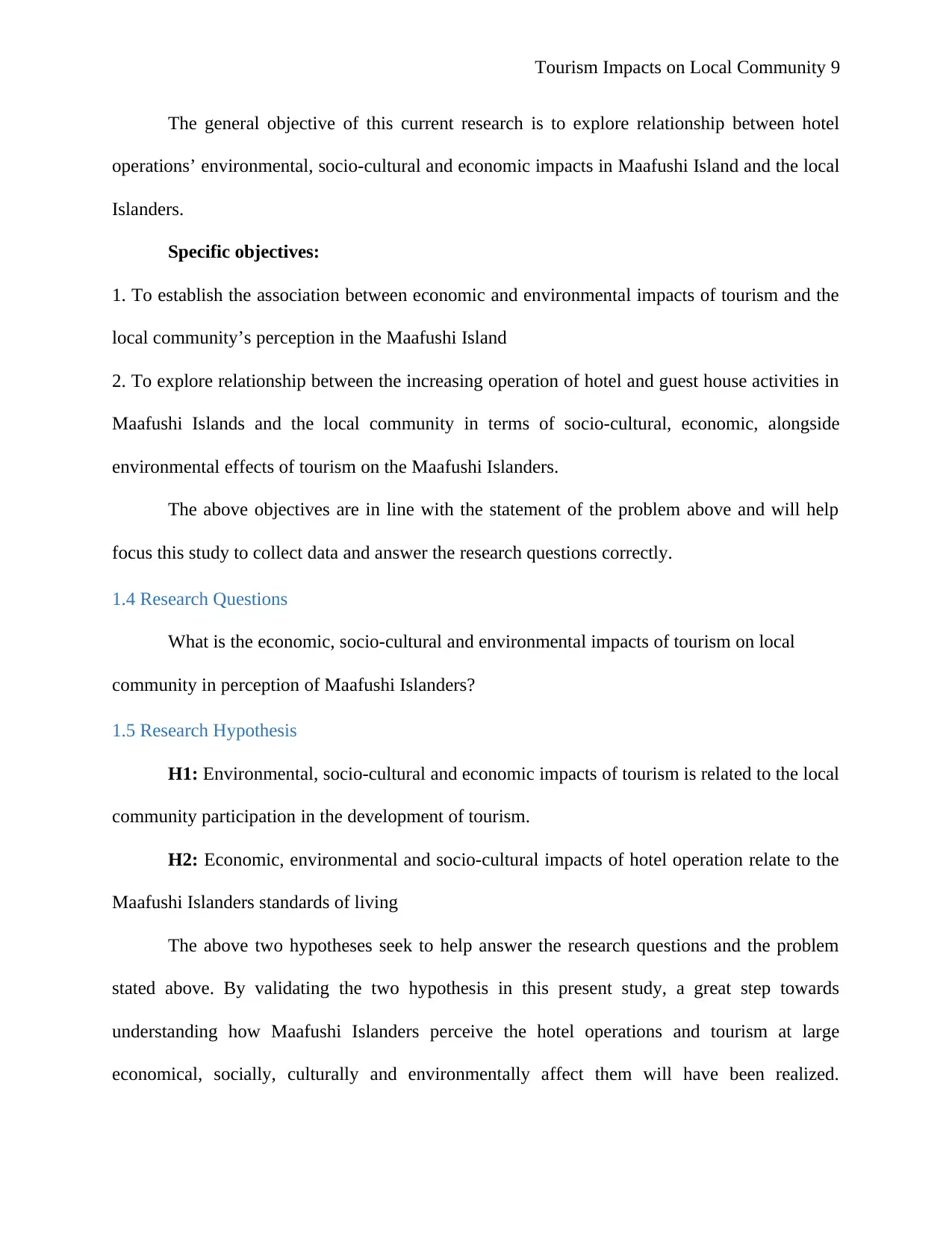
Tourism Impacts on Local Community 9
The general objective of this current research is to explore relationship between hotel
operations’ environmental, socio-cultural and economic impacts in Maafushi Island and the local
Islanders.
Specific objectives:
1. To establish the association between economic and environmental impacts of tourism and the
local community’s perception in the Maafushi Island
2. To explore relationship between the increasing operation of hotel and guest house activities in
Maafushi Islands and the local community in terms of socio-cultural, economic, alongside
environmental effects of tourism on the Maafushi Islanders.
The above objectives are in line with the statement of the problem above and will help
focus this study to collect data and answer the research questions correctly.
1.4 Research Questions
What is the economic, socio-cultural and environmental impacts of tourism on local
community in perception of Maafushi Islanders?
1.5 Research Hypothesis
H1: Environmental, socio-cultural and economic impacts of tourism is related to the local
community participation in the development of tourism.
H2: Economic, environmental and socio-cultural impacts of hotel operation relate to the
Maafushi Islanders standards of living
The above two hypotheses seek to help answer the research questions and the problem
stated above. By validating the two hypothesis in this present study, a great step towards
understanding how Maafushi Islanders perceive the hotel operations and tourism at large
economical, socially, culturally and environmentally affect them will have been realized.
The general objective of this current research is to explore relationship between hotel
operations’ environmental, socio-cultural and economic impacts in Maafushi Island and the local
Islanders.
Specific objectives:
1. To establish the association between economic and environmental impacts of tourism and the
local community’s perception in the Maafushi Island
2. To explore relationship between the increasing operation of hotel and guest house activities in
Maafushi Islands and the local community in terms of socio-cultural, economic, alongside
environmental effects of tourism on the Maafushi Islanders.
The above objectives are in line with the statement of the problem above and will help
focus this study to collect data and answer the research questions correctly.
1.4 Research Questions
What is the economic, socio-cultural and environmental impacts of tourism on local
community in perception of Maafushi Islanders?
1.5 Research Hypothesis
H1: Environmental, socio-cultural and economic impacts of tourism is related to the local
community participation in the development of tourism.
H2: Economic, environmental and socio-cultural impacts of hotel operation relate to the
Maafushi Islanders standards of living
The above two hypotheses seek to help answer the research questions and the problem
stated above. By validating the two hypothesis in this present study, a great step towards
understanding how Maafushi Islanders perceive the hotel operations and tourism at large
economical, socially, culturally and environmentally affect them will have been realized.
⊘ This is a preview!⊘
Do you want full access?
Subscribe today to unlock all pages.

Trusted by 1+ million students worldwide
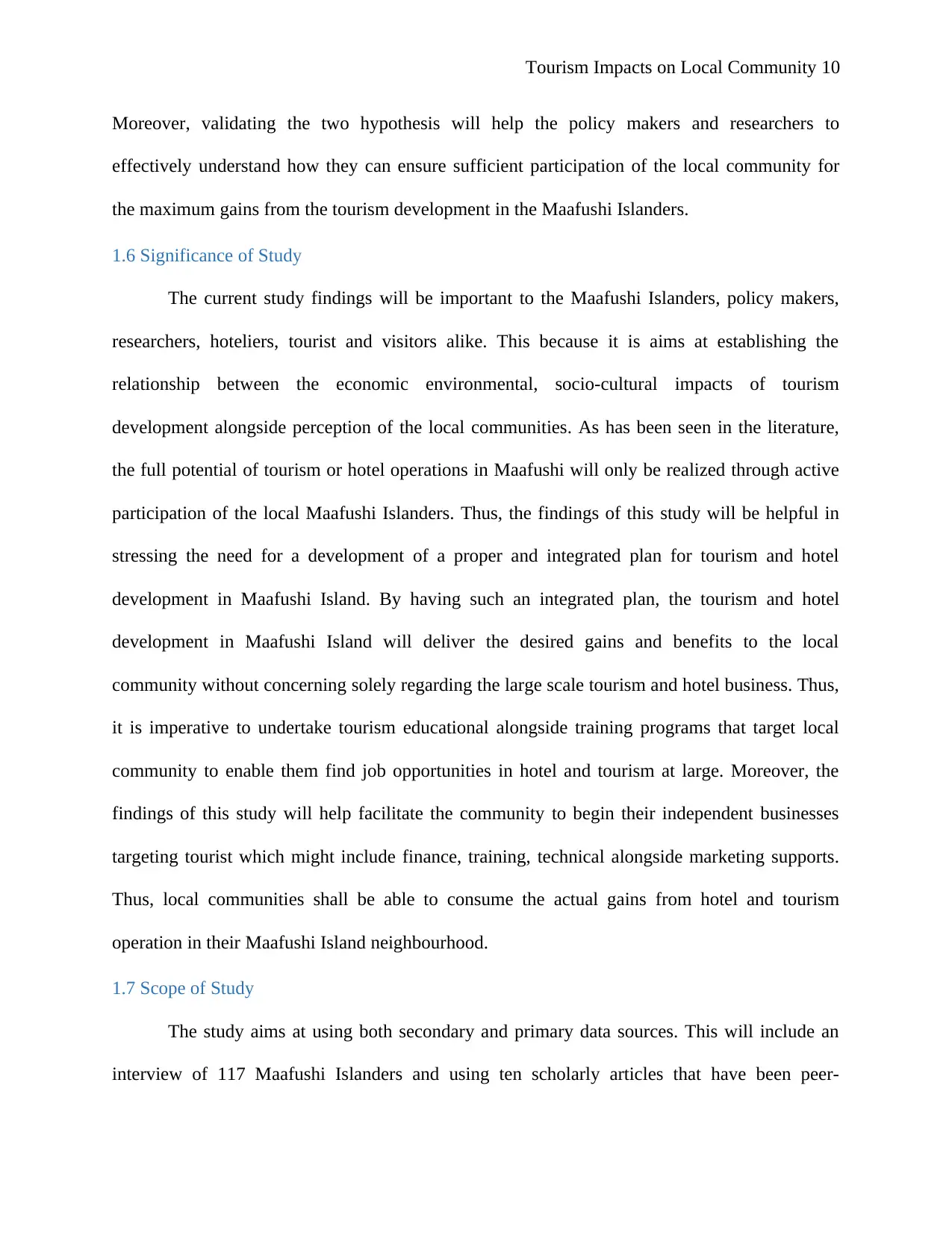
Tourism Impacts on Local Community 10
Moreover, validating the two hypothesis will help the policy makers and researchers to
effectively understand how they can ensure sufficient participation of the local community for
the maximum gains from the tourism development in the Maafushi Islanders.
1.6 Significance of Study
The current study findings will be important to the Maafushi Islanders, policy makers,
researchers, hoteliers, tourist and visitors alike. This because it is aims at establishing the
relationship between the economic environmental, socio-cultural impacts of tourism
development alongside perception of the local communities. As has been seen in the literature,
the full potential of tourism or hotel operations in Maafushi will only be realized through active
participation of the local Maafushi Islanders. Thus, the findings of this study will be helpful in
stressing the need for a development of a proper and integrated plan for tourism and hotel
development in Maafushi Island. By having such an integrated plan, the tourism and hotel
development in Maafushi Island will deliver the desired gains and benefits to the local
community without concerning solely regarding the large scale tourism and hotel business. Thus,
it is imperative to undertake tourism educational alongside training programs that target local
community to enable them find job opportunities in hotel and tourism at large. Moreover, the
findings of this study will help facilitate the community to begin their independent businesses
targeting tourist which might include finance, training, technical alongside marketing supports.
Thus, local communities shall be able to consume the actual gains from hotel and tourism
operation in their Maafushi Island neighbourhood.
1.7 Scope of Study
The study aims at using both secondary and primary data sources. This will include an
interview of 117 Maafushi Islanders and using ten scholarly articles that have been peer-
Moreover, validating the two hypothesis will help the policy makers and researchers to
effectively understand how they can ensure sufficient participation of the local community for
the maximum gains from the tourism development in the Maafushi Islanders.
1.6 Significance of Study
The current study findings will be important to the Maafushi Islanders, policy makers,
researchers, hoteliers, tourist and visitors alike. This because it is aims at establishing the
relationship between the economic environmental, socio-cultural impacts of tourism
development alongside perception of the local communities. As has been seen in the literature,
the full potential of tourism or hotel operations in Maafushi will only be realized through active
participation of the local Maafushi Islanders. Thus, the findings of this study will be helpful in
stressing the need for a development of a proper and integrated plan for tourism and hotel
development in Maafushi Island. By having such an integrated plan, the tourism and hotel
development in Maafushi Island will deliver the desired gains and benefits to the local
community without concerning solely regarding the large scale tourism and hotel business. Thus,
it is imperative to undertake tourism educational alongside training programs that target local
community to enable them find job opportunities in hotel and tourism at large. Moreover, the
findings of this study will help facilitate the community to begin their independent businesses
targeting tourist which might include finance, training, technical alongside marketing supports.
Thus, local communities shall be able to consume the actual gains from hotel and tourism
operation in their Maafushi Island neighbourhood.
1.7 Scope of Study
The study aims at using both secondary and primary data sources. This will include an
interview of 117 Maafushi Islanders and using ten scholarly articles that have been peer-
Paraphrase This Document
Need a fresh take? Get an instant paraphrase of this document with our AI Paraphraser
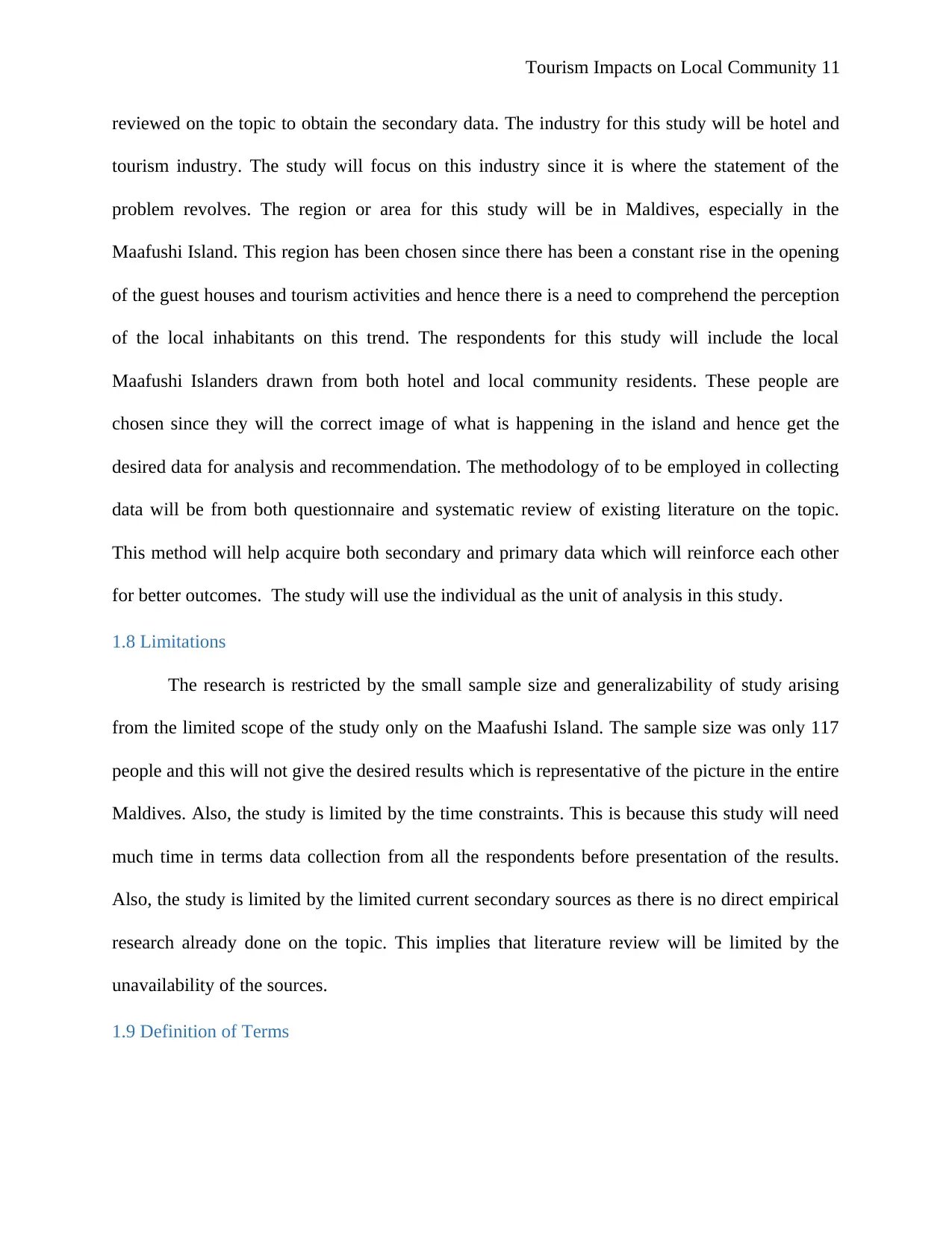
Tourism Impacts on Local Community 11
reviewed on the topic to obtain the secondary data. The industry for this study will be hotel and
tourism industry. The study will focus on this industry since it is where the statement of the
problem revolves. The region or area for this study will be in Maldives, especially in the
Maafushi Island. This region has been chosen since there has been a constant rise in the opening
of the guest houses and tourism activities and hence there is a need to comprehend the perception
of the local inhabitants on this trend. The respondents for this study will include the local
Maafushi Islanders drawn from both hotel and local community residents. These people are
chosen since they will the correct image of what is happening in the island and hence get the
desired data for analysis and recommendation. The methodology of to be employed in collecting
data will be from both questionnaire and systematic review of existing literature on the topic.
This method will help acquire both secondary and primary data which will reinforce each other
for better outcomes. The study will use the individual as the unit of analysis in this study.
1.8 Limitations
The research is restricted by the small sample size and generalizability of study arising
from the limited scope of the study only on the Maafushi Island. The sample size was only 117
people and this will not give the desired results which is representative of the picture in the entire
Maldives. Also, the study is limited by the time constraints. This is because this study will need
much time in terms data collection from all the respondents before presentation of the results.
Also, the study is limited by the limited current secondary sources as there is no direct empirical
research already done on the topic. This implies that literature review will be limited by the
unavailability of the sources.
1.9 Definition of Terms
reviewed on the topic to obtain the secondary data. The industry for this study will be hotel and
tourism industry. The study will focus on this industry since it is where the statement of the
problem revolves. The region or area for this study will be in Maldives, especially in the
Maafushi Island. This region has been chosen since there has been a constant rise in the opening
of the guest houses and tourism activities and hence there is a need to comprehend the perception
of the local inhabitants on this trend. The respondents for this study will include the local
Maafushi Islanders drawn from both hotel and local community residents. These people are
chosen since they will the correct image of what is happening in the island and hence get the
desired data for analysis and recommendation. The methodology of to be employed in collecting
data will be from both questionnaire and systematic review of existing literature on the topic.
This method will help acquire both secondary and primary data which will reinforce each other
for better outcomes. The study will use the individual as the unit of analysis in this study.
1.8 Limitations
The research is restricted by the small sample size and generalizability of study arising
from the limited scope of the study only on the Maafushi Island. The sample size was only 117
people and this will not give the desired results which is representative of the picture in the entire
Maldives. Also, the study is limited by the time constraints. This is because this study will need
much time in terms data collection from all the respondents before presentation of the results.
Also, the study is limited by the limited current secondary sources as there is no direct empirical
research already done on the topic. This implies that literature review will be limited by the
unavailability of the sources.
1.9 Definition of Terms
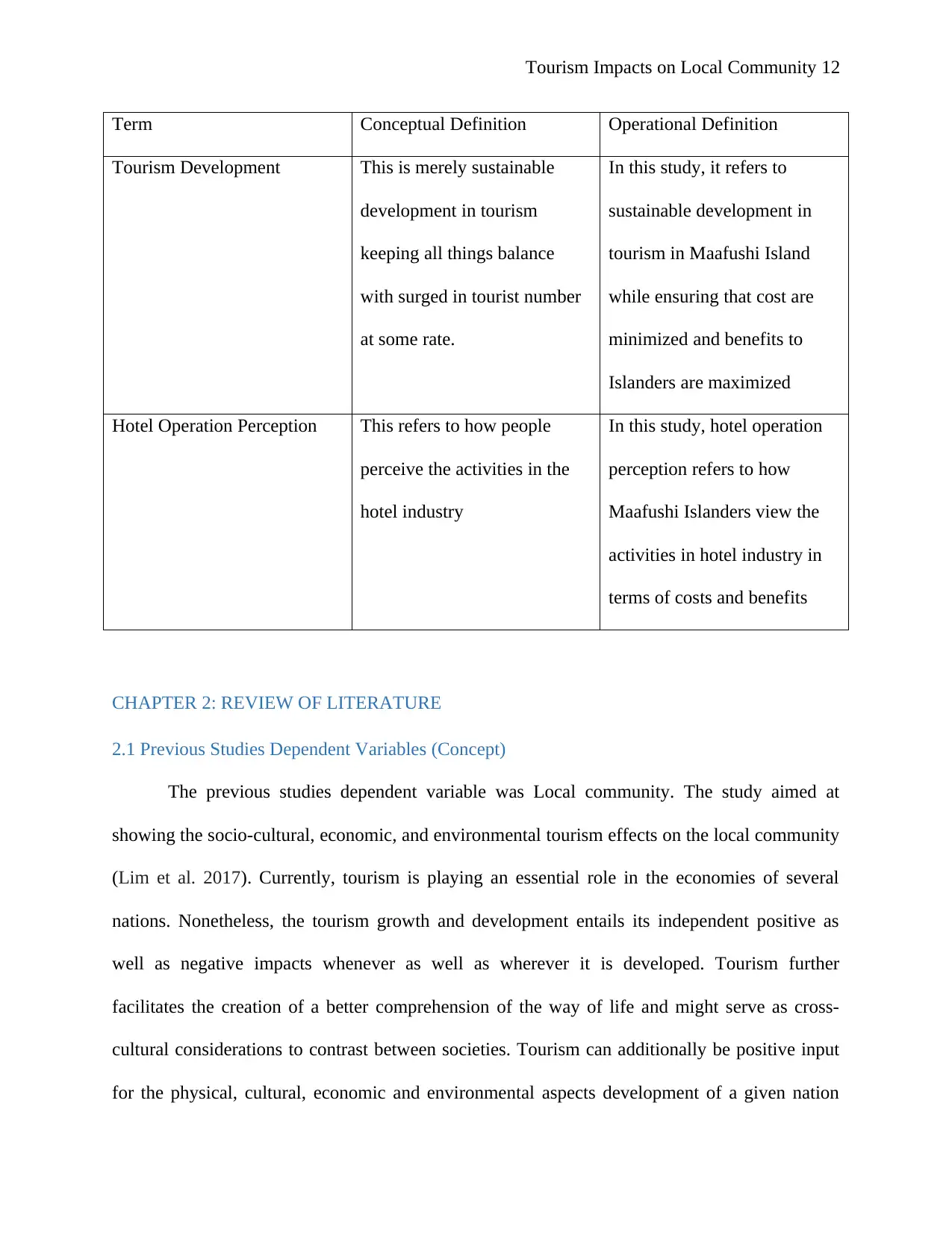
Tourism Impacts on Local Community 12
Term Conceptual Definition Operational Definition
Tourism Development This is merely sustainable
development in tourism
keeping all things balance
with surged in tourist number
at some rate.
In this study, it refers to
sustainable development in
tourism in Maafushi Island
while ensuring that cost are
minimized and benefits to
Islanders are maximized
Hotel Operation Perception This refers to how people
perceive the activities in the
hotel industry
In this study, hotel operation
perception refers to how
Maafushi Islanders view the
activities in hotel industry in
terms of costs and benefits
CHAPTER 2: REVIEW OF LITERATURE
2.1 Previous Studies Dependent Variables (Concept)
The previous studies dependent variable was Local community. The study aimed at
showing the socio-cultural, economic, and environmental tourism effects on the local community
(Lim et al. 2017). Currently, tourism is playing an essential role in the economies of several
nations. Nonetheless, the tourism growth and development entails its independent positive as
well as negative impacts whenever as well as wherever it is developed. Tourism further
facilitates the creation of a better comprehension of the way of life and might serve as cross-
cultural considerations to contrast between societies. Tourism can additionally be positive input
for the physical, cultural, economic and environmental aspects development of a given nation
Term Conceptual Definition Operational Definition
Tourism Development This is merely sustainable
development in tourism
keeping all things balance
with surged in tourist number
at some rate.
In this study, it refers to
sustainable development in
tourism in Maafushi Island
while ensuring that cost are
minimized and benefits to
Islanders are maximized
Hotel Operation Perception This refers to how people
perceive the activities in the
hotel industry
In this study, hotel operation
perception refers to how
Maafushi Islanders view the
activities in hotel industry in
terms of costs and benefits
CHAPTER 2: REVIEW OF LITERATURE
2.1 Previous Studies Dependent Variables (Concept)
The previous studies dependent variable was Local community. The study aimed at
showing the socio-cultural, economic, and environmental tourism effects on the local community
(Lim et al. 2017). Currently, tourism is playing an essential role in the economies of several
nations. Nonetheless, the tourism growth and development entails its independent positive as
well as negative impacts whenever as well as wherever it is developed. Tourism further
facilitates the creation of a better comprehension of the way of life and might serve as cross-
cultural considerations to contrast between societies. Tourism can additionally be positive input
for the physical, cultural, economic and environmental aspects development of a given nation
⊘ This is a preview!⊘
Do you want full access?
Subscribe today to unlock all pages.

Trusted by 1+ million students worldwide
1 out of 29
Related Documents
Your All-in-One AI-Powered Toolkit for Academic Success.
+13062052269
info@desklib.com
Available 24*7 on WhatsApp / Email
![[object Object]](/_next/static/media/star-bottom.7253800d.svg)
Unlock your academic potential
Copyright © 2020–2026 A2Z Services. All Rights Reserved. Developed and managed by ZUCOL.





